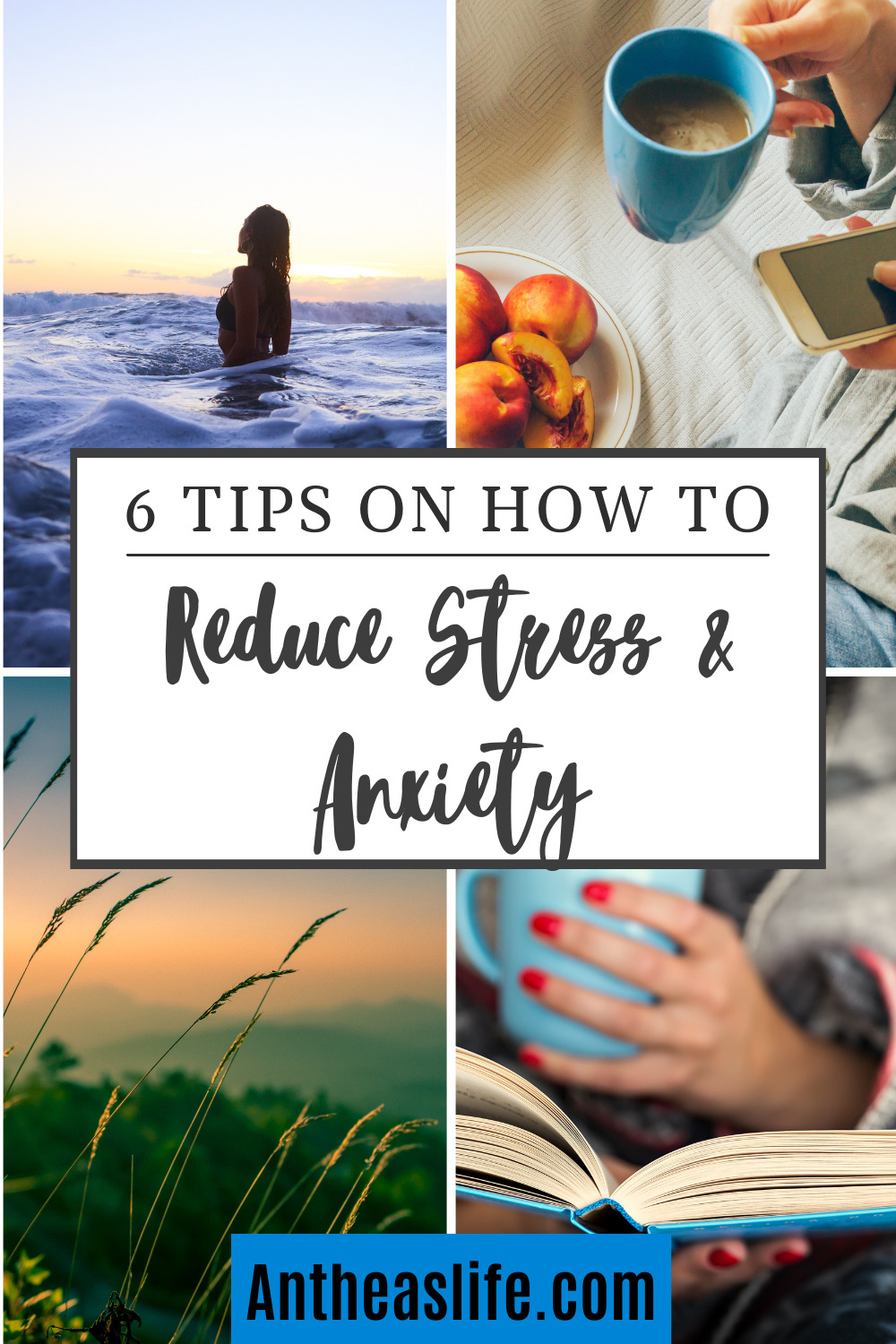My post today covers six useful tips on how to reduce stress and anxiety the natural way. Stress and anxiety are things that we all experience at some point. For some, it is something that affects their quality of life. Stress symptoms can have an adverse effect on your thoughts, body, behaviour, and feelings.
Being able to identify common stress symptoms can help you to control and manage them. When stress is left unchecked it can lead to health issues such as heart disease, blood pressure, diabetes, and obesity. Here are a few things you can do to bring down your stress and anxiety levels.
6 Tips on How To Reduce Stress and Anxiety

Schedule Me-Time
Frequent, uninterrupted “me” time can go a long way in helping your brain to unwind and unplug. With lower stress levels, you’ll be able to sleep better, have better control over your moods, and help you to be more patient and live in the moment. It’s crucial to take care of yourself to maintain emotional, physical, and emotional health. To help prevent and manage stress, you need to sleep, relax, exercise, and eat regularly. This is all part of self-care in order to live a happy and balanced life.
Read a Book
Studies show the scientific advantages of reading. There’s nothing more relaxing than curling up with a good book and forgetting about your daily troubles. Reading is proven to increase relaxation and lower stress. Reading books, in particular fiction, helps to fully engage your mind and imagination. Any action that holds meditative qualities in which your brain is fully focused on a singular task is proven to promote relaxation and lower stress and anxiety.

Keep a Stress Journal
Keeping a stress journal can help you with identifying frequent stressors in your life and how to deal with them. When addressing predictable stressors, you can either change your reaction or the situation. When you’re deciding which decision to take no matter the scenario, it helps to visualize the four A’s: avoid, alter, adapt, or accept.
* Avoid
How can you avoid these stressors? Can you avoid people that stress you out by limiting the time you spend with them? Know your limits and learn how to say “no” if you constantly feel overwhelmed about people loading more and more tasks on your shoulders or asking favours from you when you’re already swamped.
* Alter
If the stressors are unavoidable, what can you do to alter the situation or your reaction? This often involves altering the way you communicate and go about living your daily life. Instead of bottling up your feelings – express how you feel in a respectful way. Be more assertive and set some boundaries. Also, be willing to compromise.
* Adapt
If you can’t alter the stressor, alter yourself. You can choose how to react to stressful events and regain your sense of control. Look at stressful situations with a more positive outlook. Instead of blowing up over a traffic jam, rather use this time to stop and regroup, embrace the alone time, and listen to your favourite radio station.
* Accept
If you’re constantly living with high stress levels, you are putting your health and entire well-being at risk. Stress narrows your ability to think with a clear mind, function efficiently, and eat away at your happiness.
It might seem that stress is taking over your life, but you might have more control than you realize. Until you accept responsibility for the role that you are playing in creating or maintaining stress, your anxiety and stress levels will stay outside of your control.

Remember to practice gratitude – when it feels like stress is getting a hold of you, take a moment to think about the positive things and people you appreciate in your life, including your own unique qualities and gifts. This basic strategy can help you with keeping things in perspective.
Some stressors are unavoidable but the best way to cope is to accept them for what they are. Acceptance is not always easy, but long term, it is easier than battling against situations that you cannot change and that are beyond your control.
Take a Salt Bath or Swim in The Ocean
An Epsom salt bath is a super easy and budget-friendly way to relieve your body from tension and promote relaxation. Epsom salts are magnesium-rich which assists the body to produce energy. It also stabilizes mood and reduces anxiety, stress, and depression.
A swim in the ocean can also do wonders for stress relief, relaxing the muscles, and promoting better sleep, since sea water is another great source of magnesium. Swimming in the ocean has been associated with stimulating your parasympathetic system which helps your body to repair itself and rest.
It also triggers the release of serotonin and dopamine. Serotonin assists with regulating digestive functions, including appetite and bowel function, while dopamine regulates coordination and body movements.

Spend Some Time in Nature
Research reveals a connection between stress reduction and exposure to nature. Your stress levels can go down within minutes of spending time in nature. Green spaces can substantially reduce cortisol (stress) levels in your body. Nature also increases endorphin levels and dopamine generation, which endorses happiness.
Final Thoughts
I hope you have found this post about six tips on how to reduce stress and anxiety helpful and that you will implement some of them to see if it helps you.
Sending you lots of light, love, and stress-lowering vibrations!
Anthea

